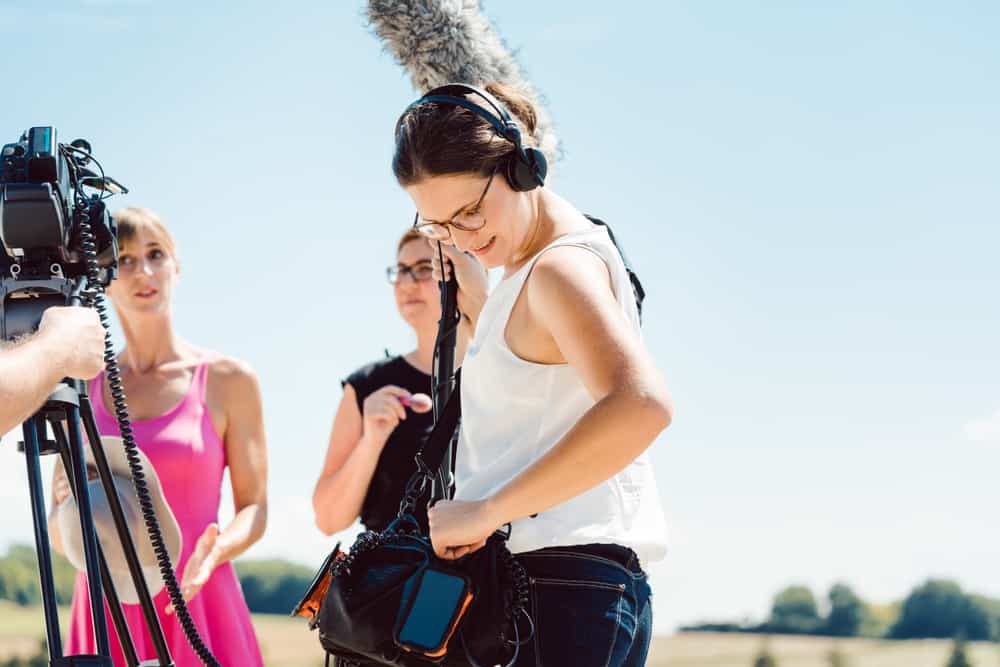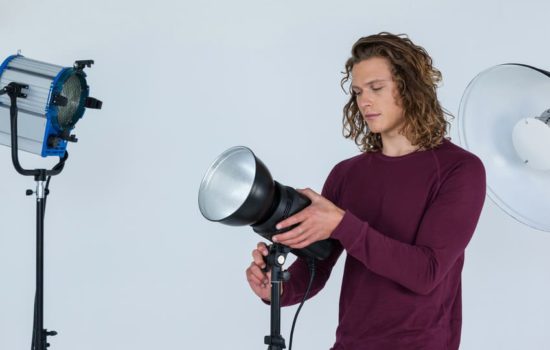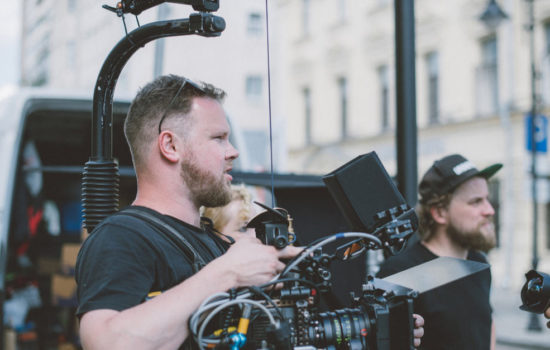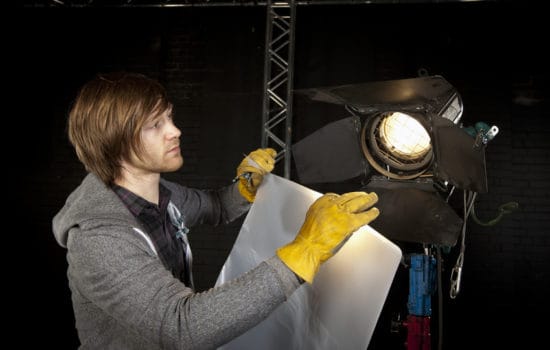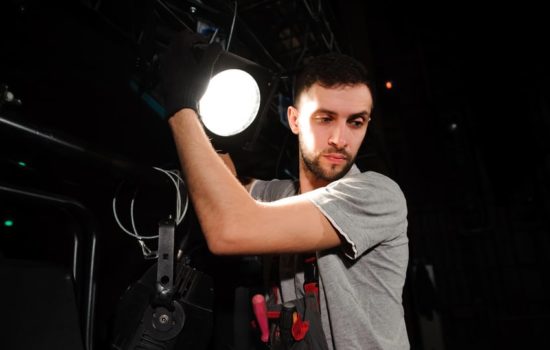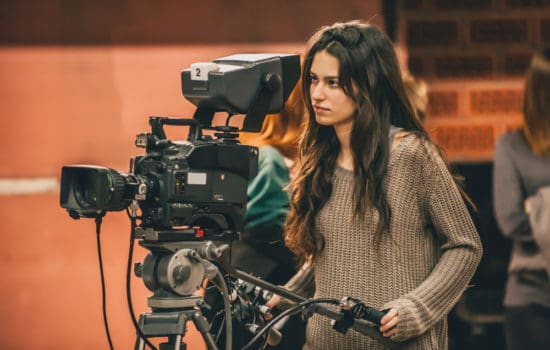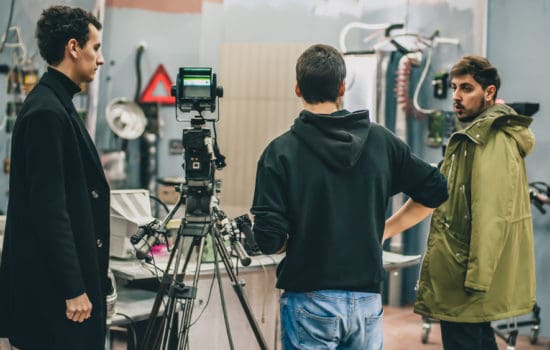If you want to organize a group to make a movie, there are three things you need before you even think about the process: a good script, good leadership skills and a whole lot of gumption.
Making a movie is a big task. It requires creativity, plus a lot of planning and resiliency because the potential of something not going as planned is very likely.
It’s a lot like painting a house – when you put the roller in the paint for the first time and start on a wall, it feels very doable . . .almost easy . . .until the reality kicks in – you have to do the whole room . . .wait, the whole house! And oh no, the color looks totally different on the wall!
So the first advice I will give you is to start with a short film. A short film can pack quite a punch and do wonders for your career, even if it is only to teach you how much you have to learn. Which brings me to the other thing you should consider before you get started: why do you want to make a film? There is no right answer to this question.
It can be very simple – maybe you want to see if you can do it. Perhaps you want to see if your writing translates on to the screen. Or, more likely, you want to pursue a career as a Director.
Whatever the answer is, having a goal will help you to the finish line. If you have never made a movie before, do not fear! You have to start somewhere. Just be humble, be ready to learn, and read on for some tips.
When you’re making movies, this is the process you need to follow:
- Write the script
- Find someone to help you produce
- Find a Cinematographer and a camera
- Find the rest of your crew
- Cast the film
- Hold Pre-production and Production Meetings
- Assemble a post-production Team
- Figure out costs
It all begins with story; and if you are just starting out and don’t know anyone, having a good script will attract collaborators. A short script can be anything up to 45 pages, but you are better off keeping it under ten; and if you can keep it to five, even better.
Make sure your script has a good story and strong characters because that will inspire talent. I would suggest getting familiar with the short film format to see what resonates with you and how story and character arcs are different in shorts. You can stream award-winning shorts on Amazon, but you can also check places like Omeleto or Seed and Spark. I’d also check out Vimeo Staff Picks.
Once you write your script, make sure that you get feedback and take time to develop it. No matter how good your first draft is, it will never be as good as one that has gone through numerous rewrites. When it comes to building a crew, you can only make one first impression; so don’t rush it.
What if you aren’t a Writer? There are plenty of Writers out there that don’t want to direct, so I would try to connect with them.
You can try online forums like Facebook Groups or there are several in-person groups that have monthly meet-ups in large cities like The International Screenwriting Association, ISA, or The Blacklist.
What are the 5 stages of filmmaking?
This is easier said than done. Many people think they want to produce, but when they realize how much work it is, they reconsider. I would be ready to do the heavy lifting yourself, but finding someone to help you, even just for moral support, is worth the search.
On my first short, I had come out of post-production and had never really worked in production so I recruited a willing friend who also knew almost nothing about production and we learned together. There is a lot to coordinate everything so sharing the duties helps a lot!
How can you make a movie?
Anna Keizer (CareersInFilm)
In the most basic sense, you likely have at your fingertips all you need – a smart phone – to shoot a movie. Most smart phones have excellent filming capabilities. Beyond that essential tool, though, you’ll need a script, Actors, at least one location, editing software, and likely a small team of crew members to make that story idea into a film. That’s all if you intend to make a movie on your own. The same basics apply to studio-backed feature films, but on a much more complicated and expensive scale.
The Camera Department is a large part of your crew. Not all Cinematographers come with a camera, so you will need to get your hands on a camera and equipment. There are professional rental houses, but you probably want to start out smaller.
Is there a film school in your town? Perhaps there is a community film program that supports local filmmakers in your neighborhood.
As a newbie, the best thing to do is look for a Cinematographer who has a camera and lighting package or has access to one. This will lighten your burden as a Producer and you won’t have to shop around for rentals, which can cost loads of money and require insurance.
I would also consider finding someone willing to experiment with a smartphone – there are lenses and apps that can make your phone footage look amazing. (Check out the Filmic Pro app and Moment lenses.) Your Cinematographer will also need a crew so I would lean on them to help find their team.
As a general rule, the best thing to do when you are starting out is to find people who are also starting out. In order for people to get better at their craft, they need to practice; so many people are looking for opportunities, such as your short, to work on. Yes! You bring something important to the table!
But where do you find these people? Again, social media is a good place to start, but I would also see if there is a film office in your town and find out if they have any workshops or opportunities to meet other filmmakers.
And honestly, before you start to recruit people to work on your short, you might want to work on somebody else’s production. Here’s why — first, it’s reciprocal. Second, you have a chance to meet other crew members and see who you like to work with. Plus, it’s a chance to learn something before you get on your own set.
The key positions you should be scouting for are Production Sound, Production Design, Costume Design, Hair and Makeup, Assistant Makeup Artist, Key Hair Stylist or Hairdresser, and an Assistant Director (who will help you schedule and run your set,) and anyone else willing to help out!
How is a movie made?
Anna Keizer (CareersInFilm)
A movie is made by following to completion the five stages of filmmaking, which are development, pre-production, production, post-production, and distribution.
First, the story idea must be developed through the creation of a script.
Second, the script is used as the foundation for the future film, which necessitates the preparation for principal photography.
Third, the shooting of the film must take place, which usually necessitates the most expense and manpower.
Fourth, the major elements of a film, including the footage and audio components, are assembled together into a completed movie.
Lastly, the film is released for audience viewing through theaters, streaming platforms, film festivals, or other distribution channels.
There are plenty of talented people hungry for an opportunity to get in front of the camera and act. And there are plenty of places you can find them. You can post a casting call on social media or you can use a service like Actors Access.
Once you put out a call, you will get loads of responses. Then you can provide sides – script pages – and have your top choices submit an audition tape for your review. You can hold in-person callbacks (second audition) or just cast them from the tape. If you hold in-person callbacks or auditions, find a place that is safe and be professional and courteous.
Once you compiled a team, you will meet with the creative heads to determine the practical things you will need to make the film, and how you want the film to look. You will then want to consult your AD to schedule the shoot and solve any logistics like parking and permits.
Though you don’t want to meet too often, because that could get in the way of your crew planning for the shoot, you do want to get everyone together for a page-by-page review of the script to make sure that nothing falls through the cracks.
As you approach the big day, make sure that everyone knows where the location is and what time everyone needs to be there. Don’t wait until the last minute to get this information out! The AD is the one who sends out the call sheets, but as a Director, and let’s face it, a Producer, you need to make sure everyone is ready and excited. It wouldn’t hurt to send out an email to get everyone pumped!
Once you have your movie in the can you will need to make it through the rest of post-production, so you will have to rinse and repeat the advice above to find your post crew. The best way to find your post crew is to look at the credits of recent shorts similar to yours.
Most post people are just like production folks, they need practice and credits to gain credibility. If you have put your best foot forward, people will want to help and be a part of it. Again, social media is a great place to recruit, but don’t be afraid to call someone.
Making a short film can cost anything from nothing to thousands of dollars. If you can get people to donate their time, you must, at least, feed them well. The days are long and a crew needs energy. Plus, a good meal is a great “thank you.”
If you feel like you want to forego the reciprocal model of making a short, you can also hire a crew. I have done this and the dollars add up, but when you hire people that have more experience, you could boost your learning curve.
The most important thing is to be ready to learn and treat anybody who walks on your set with respect. Be prepared and poised to problem-solve and support everyone you have recruited on your journey.
